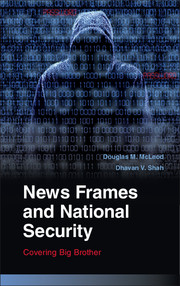1 - Understanding Message Framing and Effects
Published online by Cambridge University Press: 18 December 2014
Summary
“Ever since the 1970s, when Army intel agents were caught snooping on antiwar protesters, military intel agencies have operated under tight restrictions inside the United States. But the new provision (Senate Bill S.2386, Sec. 502), approved in closed session last month by the Senate Intelligence Committee, would eliminate one big restriction: that they comply with the Privacy Act, a Watergate-era law that requires government officials seeking information from a resident to disclose who they are and what they want the information for.”
– Michael Isikoff Newsweek Magazine June 21, 2004“Among the Americans who complain about the Patriot Act, Mohammad Junaid Babar probably dislikes it more than most. Absent that often-criticized federal statute, Babar still might stroll the sidewalks of New York, gathering money and equipment for al Qaeda. According to the unsealed transcript of his June 3 appearance before U.S. District Judge Victor Marrero, Babar pleaded guilty to five counts of furnishing ‘material support or resources to a foreign terrorist organization.’”
– Deroy Murdock The National Review October 25, 2004Both of these passages from magazine articles – the first from Newsweek and the second from the National Review – discuss the implications of domestic surveillance activities by U.S. government agencies. But this is where the similarity ends. These two excerpts represent two very different ways of telling a story about government surveillance. One obvious difference is that the first excerpt emphasizes the issue of civil liberties, while the second emphasizes the issue of national security. In addition, the stories illustrate two different common targets of government scrutiny: activist groups and Arab groups. But a more subtle difference is that the first story addresses the broader policy implications of surveillance in relation to large groups, while the second focuses on a single, potentially dangerous individual.
The differences in these stories raise a number of questions: Would audience members react differently depending on which of these stories they encountered about the debate over domestic security and civil liberties? How would the frame of the news story, whether it organized the issue around individuals or collectives, shape reactions of audience members? Are audience members more likely to favor national security over personal freedoms when seeing individuals or collectives targeted under the PATRIOT Act?
- Type
- Chapter
- Information
- News Frames and National SecurityCovering Big Brother, pp. 9 - 37Publisher: Cambridge University PressPrint publication year: 2014
- 2
- Cited by



